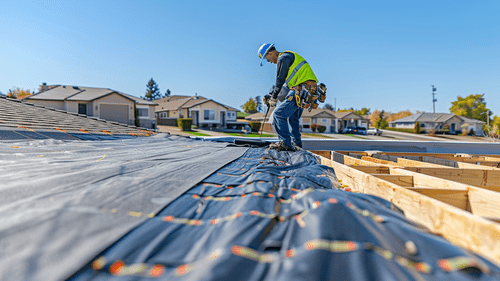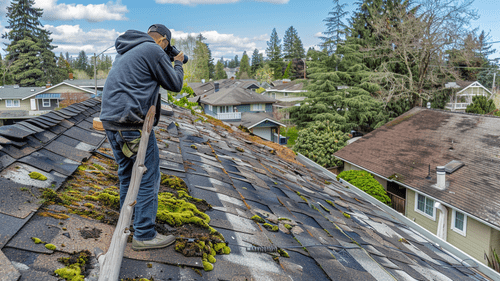Understanding the financial impact of a roofing project is crucial, but many homeowners often underestimate the costs involved. Have you ever wondered what hidden expenses might pop up during a roofing job? By planning properly and setting a realistic budget, you can avoid common pitfalls and enjoy peace of mind throughout the process. This guide will walk you through everything from evaluating your roof's current condition to breaking down labor and material costs, ensuring you're well-prepared for any surprises.
Professional inspections and detailed quotes are just the beginning. How do you choose between a full replacement and partial repairs? What should you look for in a trustworthy roofer? We'll cover these questions and more, helping you understand the importance of a comprehensive and transparent budget. With tips on recognizing red flags in quotes and planning for contingencies, you'll be equipped to make informed decisions. Ready to get started? Let's explore the details and set you on the path to a successful roofing project.
Budgeting for Your Roofing Project
Assessing Your Roofing Needs
Evaluating the Current Condition of Your Roof
Understanding the current state of your roof is the first step in budgeting for a roofing project. Signs that indicate the need for a replacement include missing or damaged shingles, leaks, sagging, and visible wear and tear. These issues can compromise the integrity of your home, leading to more significant problems if not addressed promptly.
Professional inspections are essential for accurately assessing your roof's condition. A detailed inspection will identify not only visible damage but also underlying issues that may not be immediately apparent. Trusted roofers often offer free detailed roof inspections, providing homeowners with a comprehensive understanding of their roof's health. During these inspections, expect the roofer to check for signs of water damage, structural weaknesses, and the overall lifespan of the roofing materials.
Determining the Scope of Your Project
Once the current condition of your roof is evaluated, the next step is determining the scope of your project. This involves deciding between a full replacement and partial repairs. A full replacement may be necessary if the roof is extensively damaged or nearing the end of its lifespan. On the other hand, partial repairs might suffice for minor issues, saving costs in the short term.
Considering future needs and potential upgrades is also crucial. For instance, if you plan to install solar panels or improve insulation, it might be more cost-effective to incorporate these upgrades during the roofing project. This foresight can prevent additional expenses and disruptions later on, ensuring your roofing investment provides long-term value.
Breaking Down the Costs
Labor Costs
Labor costs are a significant component of any roofing project. On average, professional roofers charge about $11 per square foot, or roughly $60 per hour. Several factors influence these rates, including the complexity of the job, the pitch of the roof, and accessibility. Steeper roofs or those with intricate designs may require more time and expertise, increasing labor costs.
Additionally, the location of your home can impact labor rates. Urban areas with higher living costs typically have higher labor rates compared to rural regions. Understanding these variables helps in setting a realistic budget and avoiding unexpected expenses.
Material Costs
Roofing material prices vary widely, ranging from $80 to $800 per roofing square (100 SF). The choice of materials significantly affects the overall cost of the project. Common options include asphalt shingles, metal, tile, and wood. Each material has its pros and cons, influencing both upfront costs and long-term value.
- Asphalt Shingles: Affordable and easy to install, making them a popular choice.
- Metal Roofing: Durable and energy-efficient but comes with a higher initial cost.
- Tile Roofing: Offers a unique aesthetic and longevity but is heavy and expensive.
- Wood Shingles: Provide a natural look but require more maintenance and have a shorter lifespan.
When selecting materials, consider not only the initial expense but also the long-term benefits. For instance, metal roofing may have a higher upfront cost but offers superior durability and energy efficiency, potentially saving money on repairs and energy bills over time.
Additional Expenses
Beyond labor and materials, several additional expenses can impact your roofing budget. These include permits, waste disposal, and unforeseen repairs. Obtaining the necessary permits ensures your project complies with local regulations, while proper waste disposal is crucial for maintaining a clean and safe worksite.
Unforeseen repairs, such as structural damage discovered during the project, can also add to the costs. This is why a detailed and transparent quote from your roofer is essential. A comprehensive quote should outline all potential expenses, providing clarity and helping you plan your budget effectively.
Avoiding Unexpected Costs
Recognizing Red Flags in Roofing Quotes
When reviewing roofing quotes, it's important to recognize red flags that could indicate potential issues. Suspiciously low estimates often come with hidden fees or subpar materials and workmanship. Trusted roofers will provide a comprehensive and accurate quote, detailing all aspects of the project.
Look for quotes that include a breakdown of labor, materials, and additional expenses. Avoid contractors who push high-pressure sales tactics or fail to provide clear answers to your questions. A trustworthy roofer will prioritize transparency and customer satisfaction, ensuring you understand every aspect of the project.
Planning for Contingencies
Setting aside a contingency budget is a prudent step in managing roofing expenses. Common unexpected issues include structural damage, weather delays, and additional repairs that may arise during the project. By allocating extra funds for these contingencies, you can avoid financial strain and ensure the project proceeds smoothly.
In addition to a contingency budget, maintaining open communication with your roofer is crucial. Regular updates on the project's progress and any emerging issues will help you stay informed and make timely decisions, further mitigating unexpected costs.
Financing Your Roofing Project
Exploring Payment Options
Financing your roofing project involves choosing between cash payments and financing plans. Each option has its pros and cons. Cash payments avoid interest charges and debt but require a significant upfront investment. Financing plans, on the other hand, spread the cost over time, making it more manageable but potentially increasing the overall expense due to interest.
When considering financing options, evaluate the terms and interest rates carefully. Some roofing companies offer financing plans with competitive rates, making it easier to budget for the project without compromising financial stability.
Maximizing Value and Efficiency
Maximizing the value and efficiency of your roofing project involves selecting quality materials and professional services. Fast and professional services ensure the project is completed efficiently, minimizing disruptions to your daily life. Additionally, consider energy-efficient upgrades, such as reflective roofing materials or improved insulation. These upgrades can reduce energy costs and provide long-term savings.
Investing in high-quality materials and workmanship not only enhances the durability and performance of your roof but also increases the overall value of your home. By prioritizing value and efficiency, you can achieve the best return on investment for your roofing project.
Wrapping Up: Ensuring a Smooth Roofing Project
Understanding the financial impact of a roofing project involves more than just a surface-level glance at costs. By evaluating your roof's current condition, determining the scope of work, and breaking down labor and material expenses, you can set a realistic budget and avoid unexpected surprises. Recognizing red flags in quotes and planning for contingencies further ensures that your project proceeds smoothly, providing peace of mind throughout the process.
Choosing between a full replacement and partial repairs, selecting trustworthy roofers, and exploring financing options are all crucial steps in managing your roofing project effectively. By prioritizing quality materials and professional services, you enhance your roof's durability and maximize your investment's long-term value. Remember, a well-planned roofing project isn't just about fixing what's broken—it's about safeguarding your home and future. Are you ready to invest wisely and protect your most valuable asset?







